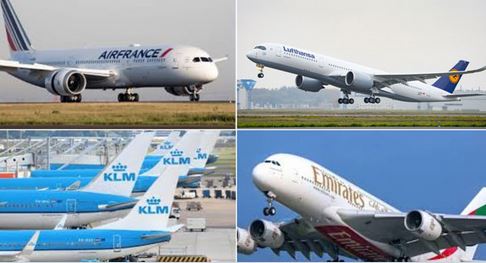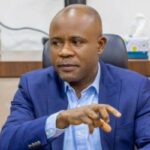
In the piece, JUSTICE OKAMGBA examines how skyrocketing costs have constrained airlines from expanding their fleet
Airline operators have said that they were facing challenges in getting additional aircraft from owners due to the high cost of operations.
The operators said escalating operational costs, particularly due to the importation of aviation fuel and exchange rate fluctuations, persistently impact their profit margins.
Addressing the concern over the high cost of aviation fuel, currently at N1,300 per litre, the Chairman of United Nigeria Airlines, Obiora Okonkwo, expressed worry that operators were on the brink of collapse as operating costs continued to worsen, especially due to the high cost of aviation fuel, which is currently sold at N1,300 per litre.
Nwankwo said it was impossible to bring in more aircraft because aircraft owners had become skeptical because of the risks of operating in Nigeria.
Nigeria is projected to need an additional 159-160 aircraft by between 2024 and 2042, according to Airbus, one of the leading aircraft manufacturers in the world.
Aircraft owners sell or usually lease their aircraft to airlines, earning consistent rental income for the duration of the lease agreement.
Commercial airplanes currently cost between $80m to over $200m. For example, the Boeing 737-700 costs $89m, the Boeing 737-800 costs $106m, and the Boeing 737 Max8 costs $121m.
The United Nigeria Airlines Chief stated, “A Nigerian airline may meet their terms, all the standard criteria but the aircraft owners consider country risk above other factors. Country risk supersedes everything and lessors have their obligations. So, there is nothing personal.
“Some airlines deposited money with the Central Bank of Nigeria, but they cannot provide us the needed dollars.”
He said airlines were making losses due to factors that were beyond their control.
“We are not only faced with the problem of scarcity of dollars; even the aviation ecosystem is feeling the heat. Handling companies have increased the cost of their services and airports have increased their charges and those that service the aircraft have also increased the cost of their services.
“The monies for these payments are coming from the passengers who are already exhausted financially,” he said.
In August, Azman Air suspended its domestic flight operations due to a shortage of aircraft.
The Chief Executive Officer of Centurion Security Limited, Captain John Ojikutu said that aviation fuel accounted for approximately 60 per cent of airlines’ operational costs.
Speaking with The PUNCH, he highlighted the need for Nigeria to resume manufacturing aviation fuel, as it did in the past, to alleviate the ongoing impact on both operators and passengers.
“Fuel plays a crucial role in commercial aviation. Could you provide information on the fuel prices in 1999 and the current rates? In the mid-1990s, fuel refining occurred in Nigeria, but for over two decades, we’ve been importing fuel, which is now impacting ticket prices,” he enunciated.
The former Commandant of the Murtala Muhammed International Airport, Lagos, said the sale of the Port Harcourt refinery to Aliko Dangote by former President Olusegun Obasanjo presented an opportunity to reverse the trend of fuel importation.
“Unfortunately, the refinery was taken away from Dangote, leading to continued fuel importation, contributing to economic challenges with the weakening naira,” he noted.
According to Ojikutu, with the current price of aviation fuel, air tickets for local travel will cost as much as N140,000.
On Monday, the naira reached an all-time low, falling to 1,534/$ on the Nigerian Autonomous Foreign Exchange Market.
“In the 1990s, airfares were about $100. How many Nigerians can afford $100 today, and then naira was exchanged at 40/$. The naira is exchanged at 1,500/$,” the former commandant said.
In the first nine months of 2023, Nigeria spent N358.08bn on aviation fuel, according to data from the National Bureau of Statistics. In the same period the previous year, it spent N487.73bn.
A former President of the National Association of Aircraft Pilots and Engineers, Sheri Kyari, stated that operational costs were linked to a lot of factors and the most glaring was aviation fuel.
“It will continue to be high as long as we are importing it into the country. The value is subject to the exchange rate,” Kyari told The PUNCH.
Kyari suggested that if Aliko Dangote and others opt to produce aviation fuel, the price of the product may decrease.
He, however, warned that if production doesn’t occur, little is likely to change.
In October, the Airline Operators of Nigeria requested the Federal Government’s permission to obtain the necessary license for importing and distributing aviation fuel. The request is yet to be granted.
The President of AON, Abdulmunaf Yunusa, said, “There is an urgent need to facilitate the liberalisation, procurement, and distribution of Jet A1 nationwide and allow AON to procure a requisite license for product importation and distribution and also an immediate review of all industry taxes and charges to determine applicability in line with cost recovery model.”
In an interview with CNBC monitored by our correspondent, the Regional Vice-President for Africa and the Middle East at the International Air Transport Association, Kamil Al Awadhi, said the cost of operating airlines in Nigeria was one of the most expensive in Africa.
“Airlines have lost a lot of money operating in and out of Nigeria and it continues to be so under the current environment. As things improve, then the airlines will start generating something, then there is less risk, and obviously, these costs will go down,” he stated.
On Monday, the acting Director-General of NCAA, Chris Najomo, reacted to the news that aviation fuel was N1,300 by setting up a committee to work on the reduction of the fares.
The regulator in a statement said, “It has come to the notice of this authority about the increase and high cost of airfare, especially on international travels.
“The NCAA in the view of trying to make sure that these airfares are brought down, have decided to set up a high-powered committee, which will look at all the variances and how we can bring these fares down.”





